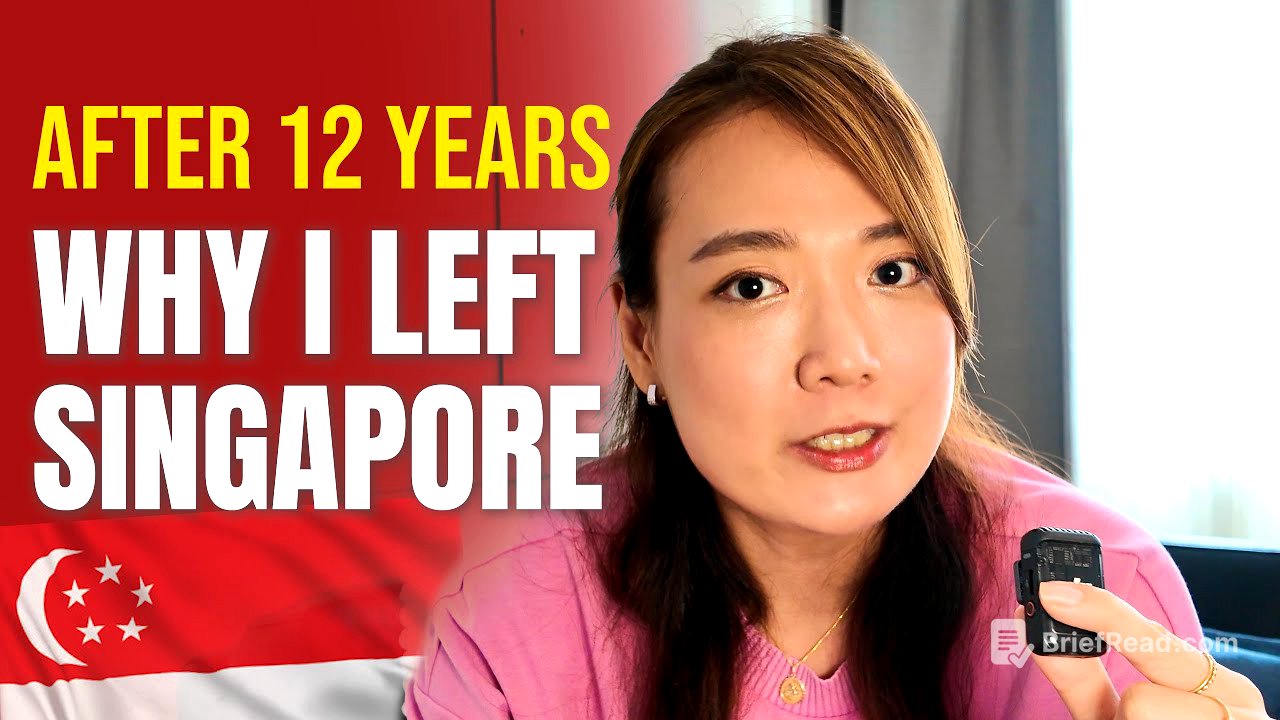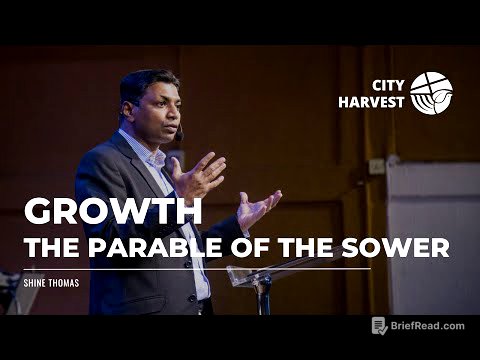TLDR;
Bella shares her experience of living and working in Singapore as an expat for 12 years, highlighting both the pros and cons. She talks about the opportunities, low taxes, and multicultural environment but also points out the hidden costs like competitive work culture, high rent, and the stress of constantly meeting visa requirements. Ultimately, she moved to Germany for better opportunities and a clearer path to permanent residency.
- Singapore offers great job opportunities and a multicultural environment.
- The cost of living, especially rent, is very high.
- Visa requirements are strict and constantly changing, causing stress.
- Permanent residency is difficult to obtain without marrying a Singaporean.
- Germany offers a more transparent path to permanent residency.
Intro & My Story [0:00]
Bella, who is from Taiwan, introduces the video by saying she will share her unfiltered experiences of living in Singapore as an expat for 12 years, including five years on an Employment Visa. She hopes to provide insights into the hidden risks and costs associated with moving to Singapore as an expat, so that people can make informed decisions. She is not trying to discourage anyone, but wants to provide a realistic view.
Why Singapore is Great [0:31]
Singapore is the best country in Asia to live and work in, according to Bella. Singapore attracts a lot of international companies, which creates numerous job opportunities. English is widely spoken, making it easy to communicate. The tax rates are low. The country is small, well-organized, and efficient, with convenient public transportation that is air-conditioned. She loves the Hawker Center culture, where you can get a full meal for a low price. The environment is multicultural with a variety of cuisines. People care about fitness, and there are beautiful park connectors for running and cycling. Changi Airport is the best in the world, making arrivals feel like a VIP experience. The cultural exchange with people from different countries is enriching.
Hidden Costs & Challenges [2:34]
Working overtime is the norm in Singapore, with people expected to respond to work messages even on weekends. The work environment is very competitive, described by the term "Kiasu," meaning "scared of losing." Rent is very high; a single bedroom with shared facilities can cost S$1,000 to S$1,500, while a studio or two-bedroom apartment starts at S$3,000 per month. Bella never felt like she had a place to call home in Singapore. As an expat, your visa depends on your job, and losing your job means you have to leave. The government frequently changes employment visa laws, which can cause you to lose your visa if you no longer meet the criteria.
Singapore Work Visa Types [4:19]
The different types of employment visas in Singapore mainly vary based on the minimum salary required. The Work Permit (WP) has a very low salary requirement and is mostly for domestic helpers, with restrictions such as not being able to get pregnant and requiring applicants to be from specific countries. The S Pass (SP) is difficult to obtain due to limited quotas for companies. The Employment Pass (EP) is for highly-skilled workers, with the salary requirement increasing over the years. Only SP and EP holders are eligible to apply for Singapore Permanent Residency, indicating that Singapore prefers highly skilled, high-value individuals.
Work Visa Struggles [5:44]
Bella didn't manage to get an SP, so she was stuck trying to get an EP. She got laid off, which prevented her from applying for Singapore PR. EP criteria have become stricter, considering factors like industry, qualifications, and whether Singapore needs those professionals. The minimum salary increases with age. Constantly chasing these criteria was stressful for Bella, and she felt her personal value was tied to them. If your current contract just meets the minimum salary for a visa, be cautious as the requirements may increase, causing you to lose your visa.
PR (Permanent Residency) Problems [7:07]
If you get an SP or EP, Bella suggests applying for Singapore PR as soon as possible. However, the application process is not transparent. It might be approved quickly, take several applications over many years, or never be approved. You must maintain your job during this waiting time. The only guaranteed way to get Singapore PR is by marrying a Singaporean or a Singapore PR. As a result, many expats leave Singapore, and after 12 years, only a small percentage of Bella's friends are still there.
Why I Left Singapore [8:05]
Bella left Singapore because she didn't get the chance to apply for Singapore PR and spent six months looking for a new job. Despite getting many interviews, including from S&P 500 companies, she was often rejected because she is Taiwanese. Recruiters told her that companies are unlikely to hire foreigners now. Even if you meet the EP criteria, companies need to advertise the job on a Singapore recruitment website for two months and then prove that no suitable Singaporean can fill the position, which takes additional time for EP application approval. After six months, she got a job offer, but they couldn't get her a visa for their Singapore company. She decided to move to their headquarters in Germany.
What I Could Have Done Better [10:15]
If Bella could change one thing about her life in Singapore, she would tell herself not to be so stressed at work. She needed to accept that things cannot be controlled and that there was a chance she might need to leave Singapore, which is okay. She advises others to not be so stressed, which can cause white hair and weight gain, and to enjoy life. If you are meant to be there, you will stay; if not, something better is waiting for you elsewhere.
Why I Chose Germany [11:16]
Bella moved to Germany because of the job offer and the opportunity to get a Blue Card, which allows her to apply for German permanent residency after 21 months of paying tax. The process is completely transparent, and you can get German PR without any issues.
Life Lesson & Conclusion [11:40]
Bella shares the lesson she learned during her time in Singapore: be brave to accept challenges and always be ready for changes. Assess the hidden risks and make sure you have enough savings before moving to a new country, as things can be more complicated when you are not in your home country.






![Notion Tutorial - Full Course for Beginners [2025]](https://wm-img.halpindev.com/p-briefread_c-10_b-10/urlb/aHR0cDovL2ltZy55b3V0dWJlLmNvbS92aS9rT2YzUVNCVjI5WS9ocWRlZmF1bHQuanBn.jpg)


